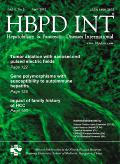
Hepatobiliary & Pancreatic Diseases International
Scope & Guideline
Championing excellence in hepatobiliary and pancreatic research.
Introduction
Aims and Scopes
- Liver Diseases and Transplantation:
The journal emphasizes research on various liver diseases, including hepatocellular carcinoma, liver cirrhosis, and liver transplantation techniques. It aims to improve understanding of disease mechanisms and enhance surgical and therapeutic approaches. - Pancreatic Disorders:
There is a significant focus on pancreatic diseases, particularly pancreatic cancer and pancreatitis. The journal publishes studies on diagnosis, treatment strategies, and novel surgical techniques related to these conditions. - Biliary Pathology:
Research on biliary diseases, including cholangiocarcinoma and complications from biliary interventions, is a core area. The journal explores both surgical and non-surgical management options. - Innovative Surgical Techniques:
The journal highlights advancements in surgical methods, including minimally invasive techniques and robotic surgery, aimed at improving patient outcomes in liver and pancreatic surgeries. - Clinical and Translational Research:
Emphasizing the bridge between laboratory research and clinical application, the journal encourages studies that translate scientific findings into practical treatments for liver and pancreatic diseases. - Immunotherapy and Molecular Approaches:
There is a growing interest in the role of immunotherapy and molecular biology in the treatment of hepatobiliary and pancreatic cancers, reflecting modern therapeutic strategies.
Trending and Emerging
- Personalized Medicine and Genomics:
There is an increasing focus on personalized medicine approaches, including genomic profiling and tailored therapies for hepatobiliary and pancreatic cancers, reflecting the trend towards individualized patient care. - Immunotherapy Advances:
Research on immunotherapy, including checkpoint inhibitors and novel immunotherapeutic strategies, has gained significant traction, highlighting its potential in treating liver and pancreatic cancers. - Artificial Intelligence and Machine Learning:
The application of AI and machine learning for diagnostics and treatment predictions is on the rise, showcasing innovations in data-driven approaches to hepatobiliary and pancreatic diseases. - Multidisciplinary Approaches to Treatment:
Emerging themes include collaborative, multidisciplinary approaches to managing complex cases in hepatobiliary and pancreatic surgery, integrating surgical, medical, and supportive care. - Microbiome and Liver Health:
Research exploring the relationship between the gut microbiome and liver disease is gaining attention, indicating a growing interest in the microbiome's role in health and disease. - Regenerative Medicine and Stem Cell Therapy:
There is an increasing exploration of regenerative medicine and stem cell therapy as potential treatments for liver diseases, reflecting advancements in biological therapies.
Declining or Waning
- Traditional Surgical Techniques:
There appears to be a waning emphasis on traditional open surgical techniques for hepatobiliary and pancreatic surgeries, as the field increasingly adopts minimally invasive and robotic approaches. - Conventional Imaging Techniques:
With the advent of advanced imaging modalities and radiomics, traditional imaging methods for diagnosing liver and pancreatic diseases are becoming less prominent in the journal's publications. - Single-Agent Chemotherapies:
Research focused solely on single-agent chemotherapy regimens for hepatobiliary malignancies has decreased, likely due to the shift towards combination therapies and personalized medicine. - Basic Science Studies:
There is a noticeable decline in basic science studies that do not directly translate to clinical practice, as the journal prioritizes research with immediate clinical applicability. - Epidemiological Studies without Novel Insights:
Epidemiological studies that do not provide new insights or advancements in understanding disease mechanisms or treatment are becoming less frequent.
Similar Journals

Journal of Hepato-Biliary-Pancreatic Sciences
Connecting professionals through rigorous peer-reviewed research.The Journal of Hepato-Biliary-Pancreatic Sciences, published by WILEY, is a premier academic platform dedicated to advancing research in the domains of hepatology and surgical sciences. With an impressive impact factor and categorized as Q2 in Hepatology and Q1 in Surgery for 2023, the journal ranks #85 out of 495 in Medicine Surgery and #36 out of 70 in Medicine Hepatology, highlighting its significant contributions to the medical community. Although the journal's coverage in Scopus was discontinued from 2010 to 2021, its previous engagement with the Scopus database reinforces its relevance and quality control within the field. Researchers, clinicians, and students will find a wealth of rigorously peer-reviewed articles that address critical issues and innovative practices in the treatment of hepatobiliary and pancreatic disorders. As an essential resource for advancing knowledge and enhancing clinical practice, the Journal of Hepato-Biliary-Pancreatic Sciences aims to foster significant dialogue and collaboration among professionals dedicated to improving patient outcomes in these intertwining specialties.

Ultrasound
Advancing the Future of ImagingUltrasound is a renowned journal published by SAGE Publications Ltd, dedicated to the dynamic field of radiology and ultrasound technology. Established in 1993, this pivotal journal serves as a crucial platform for the dissemination of cutting-edge research and clinical advances, covering a range of topics from diagnostic ultrasound techniques to innovative imaging protocols. With an ISSN of 1742-271X and an E-ISSN of 1743-1344, it significantly contributes to the scholarly conversation within the field, highlighted by its Q3 rankings in both Radiological and Ultrasound Technology and Radiology, Nuclear Medicine, and Imaging categories for 2023. Although it operates under a subscription model, the journal is essential for researchers, professionals, and students seeking to stay informed about advancements and trends in ultrasound applications. Located in the United Kingdom, this journal emphasizes the importance of high-quality imaging practices and their implications in modern medicine, making it a vital resource for the ongoing education and advancement of its readership.
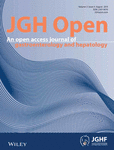
JGH Open
Fostering Collaboration for Global Health AdvancesJGH Open is a prominent open-access journal dedicated to advancing knowledge in the fields of Gastroenterology and Hepatology, published by WILEY. Since its inception in 2017, the journal has served as a crucial platform for researchers, professionals, and students to disseminate innovative research findings and clinical insights. With an impact factor and Scopus rankings reflecting its steady growth—ranking in the 3rd quartile for both Gastroenterology (Q3) and Hepatology (Q3)—JGH Open is positioned within the competitive landscape of medicine. Its commitment to open access enhances the visibility and accessibility of high-quality research, ensuring that significant advancements in understanding diseases of the gastrointestinal tract and liver reach a broad audience. With a focus on collaboration and dissemination of knowledge, JGH Open aims to contribute to the global discourse and improve outcomes in gastrointestinal health.

Hepatology Forum
Empowering knowledge exchange for liver disease advancements.Hepatology Forum is an esteemed journal dedicated to disseminating cutting-edge research and insights in the fields of gastroenterology and hepatology. Published by KARE PUBL in Turkey, this journal serves as a vital platform for researchers, clinicians, and healthcare professionals aiming to advance their knowledge and practices related to liver diseases and gastrointestinal disorders. With an ISSN of 1307-5888 and an E-ISSN of 2757-7392, it features peer-reviewed articles that encompass a wide range of topics from basic research to clinical applications. Although categorized in the Q3 quartile for both gastroenterology and hepatology in 2023, Hepatology Forum continues to show significant potential for growth and impact, as evidenced by its Scopus rankings. Through its commitment to open scientific exchange, the journal not only facilitates the sharing of innovative methodologies and findings but also fosters networking among professionals in the field. As it converges through the years from 2020 to 2024, Hepatology Forum remains an important resource for the advancement of liver health and diseases, appealing to both established experts and emerging scholars alike.

Journal of the Pancreas
Advancing pancreatic health through innovative research.Journal of the Pancreas is a pivotal academic publication dedicated to advancing our understanding of pancreatic diseases and disorders. Published by E S Burioni Ricerche Bibliografiche, this journal aims to disseminate novel research findings, case studies, and reviews pertaining to the diagnosis, treatment, and management of pancreatic conditions. With its ISSN 1590-8577, the journal has made significant contributions to the medical field since its inception in 2000, although it ceased its coverage in Scopus in 2015. The Journal of the Pancreas is particularly valuable for researchers, healthcare professionals, and students in gastroenterology and related fields, as it supports evidence-based practices and promotes collaboration in the exploration of pancreatic health. The importance of this journal is underscored by its commitment to providing high-quality, peer-reviewed research that informs clinical approaches and enhances patient outcomes.

Frontline Gastroenterology
Bridging Research and Practice in Digestive DisordersFrontline Gastroenterology is a leading academic journal published by the BMJ Publishing Group that plays a vital role in advancing the field of gastroenterology and hepatology. Established in 2013, this prestigious journal has established itself as a significant resource for researchers, healthcare professionals, and students alike, maintaining a commendable impact factor and consistently achieving a Q2 ranking in both gastroenterology and hepatology categories as of 2023. With its focus on disseminating high-quality, peer-reviewed research, Frontline Gastroenterology covers a wide scope of topics pertinent to the understanding, diagnosis, and treatment of gastrointestinal and liver diseases. Although it does not offer Open Access options, its content is accessible through various institutional and personal subscriptions, ensuring that critical findings reach an international audience. As the journal continues to converge into the future, it remains dedicated to fostering innovation and dialogue in gastroenterological sciences.
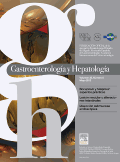
Gastroenterologia y Hepatologia
Connecting scholars to the forefront of gastroenterology and hepatology.Gastroenterologia y Hepatologia, published by Elsevier España SLU, is a distinguished journal dedicated to advancing the fields of gastroenterology and hepatology. With a publication history spanning from 1982 to 2024, this journal is recognized for its commitment to disseminating high-quality research and reviews that address critical developments in the diagnosis and treatment of gastrointestinal and liver diseases. Although it currently ranks in the Q3 quartile in both gastroenterology and hepatology based on the 2023 metrics, the journal continues to attract a global audience of researchers, healthcare professionals, and students eager to engage with the latest findings. The journal is accessible in both print and electronic formats (ISSN: 0210-5705), making its valuable insights reachable to a broad spectrum of subscribers. By fostering a platform for rigorous scholarly communication, Gastroenterologia y Hepatologia plays a vital role in shaping the future of research in these essential medical fields.
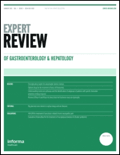
Expert Review of Gastroenterology & Hepatology
Exploring the Frontiers of Digestive HealthExpert Review of Gastroenterology & Hepatology is a premier journal published by Taylor & Francis Ltd that aims to bridge the gap between clinical practice and research in the fields of gastroenterology and hepatology. Established in 2007, this journal has rapidly gained recognition, boasting a Q1 ranking in Gastroenterology and a Q2 ranking in Hepatology for 2023, while achieving impressive Scopus rankings of 31st and 25th respectively in these disciplines, placing it within the top 81st and 70th percentiles. The journal’s objective is to provide a comprehensive platform for the latest developments, innovative treatments, and critical reviews, catering to researchers, healthcare professionals, and students alike. Located in the United Kingdom, the journal does not operate under an open access model but ensures that its content is accessible to a global audience through institutional subscriptions. By consistently publishing high-impact reviews and articles, Expert Review of Gastroenterology & Hepatology solidifies its role as a vital resource in advancing knowledge and clinical practice within these challenging and evolving fields.

Translational Gastroenterology and Hepatology
Advancing Patient Outcomes through Translational Research.Translational Gastroenterology and Hepatology, published by AME Publishing Company, stands as a pivotal platform for advancing the understanding and treatment of gastrointestinal and liver diseases. With its focus on translational research, this journal aims to bridge the gap between laboratory discoveries and clinical applications, thus fostering improvements in patient care. Although specific metrics like H-Index and Scopus ranks are currently unavailable, the journal is committed to maintaining high standards of scholarly communication and excellence. As an open-access publication, it ensures that valuable findings are readily accessible to a global audience, promoting collaboration and innovation among researchers, clinicians, and healthcare professionals invested in gastroenterology and hepatology. The journal's dedication to disseminating groundbreaking research makes it an essential resource for those seeking to stay at the forefront of these ever-evolving fields.
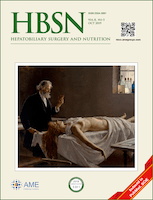
Hepatobiliary Surgery and Nutrition
Innovating hepatobiliary care for better patient outcomes.Hepatobiliary Surgery and Nutrition is a leading journal dedicated to advancing the fields of hepatobiliary surgery and nutritional science, published by AME Publishing Company. With a commitment to disseminate high-quality research, this journal serves as a vital platform for clinicians, researchers, and students alike to share their findings and insights related to liver and biliary health. The journal operates under an Open Access model, ensuring that cutting-edge research is readily available to a global audience. Although specific rankings and impact factors are currently not provided, the journal's focus on innovative surgical techniques and nutritional strategies underscores its importance in improving patient outcomes and shaping future practices in hepatobiliary medicine. Situated in Hong Kong, Hepatobiliary Surgery and Nutrition invites submissions that push the boundaries of knowledge in these crucial areas, fostering a collaborative environment for advancement in surgery and nutrition.